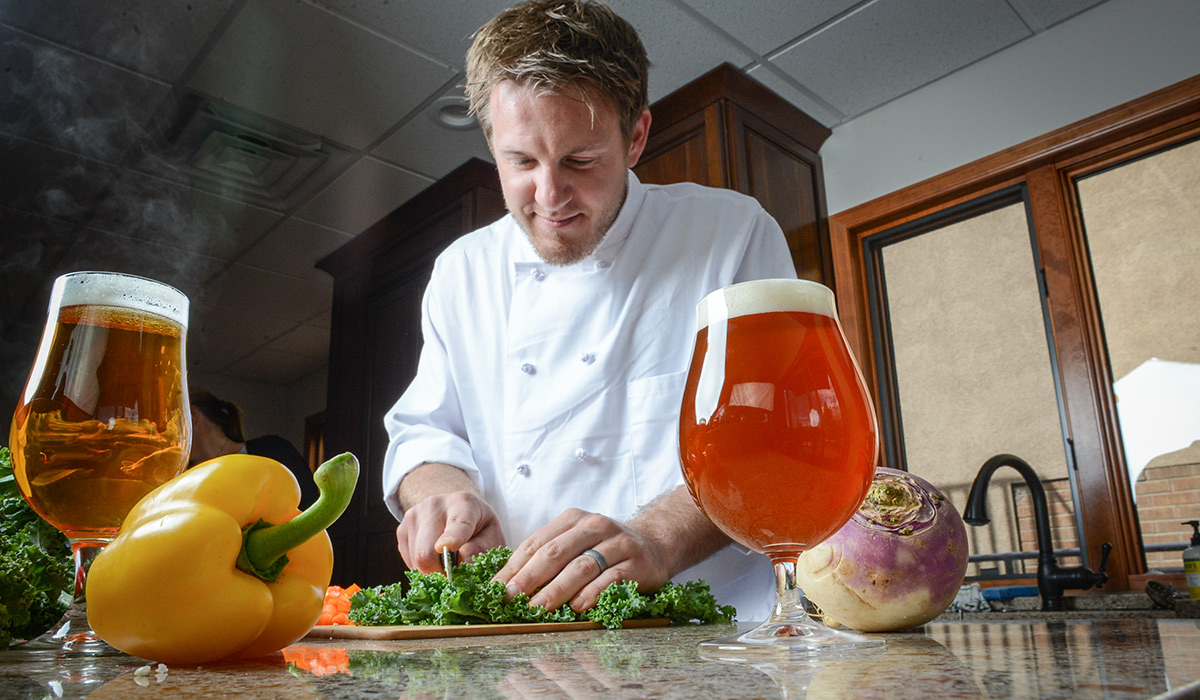As the snow melts and the spring bloom begins to take shape here, are a few key food and beer pairing tips to help spring you right into summer.
[newsletter_signup_box]
Pair that Hazy IPA
As the hazy IPA boom hits, so too does the pairing of this new beer style. Look for crisp and bright produce such as English peas, asparagus and artichokes to complement the mouthfeel of the hazy as well as the softer yet brighter pop of the hops. Green onions, ramps, scapes and spring onions can bring out the bittering hops a bit more. Careful, though, as you will want to cook these (light up that grill!) and use them to accompany cuts of meat and fish.
(COOK WITH BEER: Find Recipes)
Finish with Acidity
As cooking turns to fresh produce and simple techniques of grilling, sautéing and even raw preparations, acidity is coming in to finish the dish. You’ll find it in everything from a squeeze of lemon over mixed greens, fresh grilled fish, shellfish and even tomatoes to the gentle touch of vinegar. Fruit-based vinegars are great for finishing dishes from apple to pear and even cherry.
Marinating something for the grill? Add some sliced lemon to chicken and fish or lime to red meat just before grilling and finish with a fresh squeeze while the meat rests.
Beer wise, look to pair pilsner, kolsch, pale ale and IPA with acidity and let the pop from the acidity highlight the hops.
Churn Your Own Butter or Find Local Craft Butter
This is easier than you think and it can also be a fun group dining activity. Fresh churned butter is creamier, smoother and richer than the blocks at the store just like ice cream made fresh. Use it to finish dished or spread on warm bread.
For the group task, put 1 cup of room temperature heavy cream into a quart container and seal the lid tightly. Shake vigorously and constantly for 20 minutes. NO STOPPING. You will see the cream go through the whipped cream stage (i.e. the taste testing stage) then break. Little clumps will be floating in a cloudy liquid (note: this is now buttermilk). Strain the clumps out and then rinse gently with cold water to remove any excess buttermilk. Season with salt, mix gently and serve!
For the easier version sub out a food processor for the handshaking method and do not fill the processor more than half full.
Want to make hop butter? Add 1/8 teaspoon of whole cone or finely ground pellet hops to 1 cup of butter.
(SEASONAL BEERS: Find New Beers for Spring and Summer)
Mushrooms, Mushrooms, Mushrooms
Morels
The grand king of spring. These are only around for a few weeks and may come with sticker shock, but a fresh morel is well worth the price. Simply sautéed with butter, fresh herbs and garlic is one of the best ways to prepare. Add morels to pasta dishes with a little parmesan cheese, a roast chicken or grilled beef steak.
Porcini
Also called cepe or bolete, is best grilled or broiled and can be added simply to salads with arugula, served on their own or added to a rich cream sauce for an indulgent bite.
Hen of the Woods
Also called Maitake, these mushrooms have a light and feathery texture and are best sautéed or fried. Their hearty flavor comes through in risottos or served on their own with an aioli based sauce for dipping. These mushrooms can be quite the showstopper with their feathery appearance and height when used whole.
Beer wise, look for mushrooms to add a punch of umami to your palate. Let these boomers sing with a brown ale or porter this summer. For a lighter pairing go towards a hoppy and bolder pilsner and let the carbonation play off the umami.
(LEARN: Big List of Beer Schools)
Fermentation, Preservation, Pickling 
Let’s face it: spring and summer are here and gone all too fast to capture all the flavors. And within that you might miss cherries, plums, peaches, cucumbers, tomatoes, green beans, fresh shelling beans, grapes, blackberries, blueberries … the list goes on and on. One way to capture these ingredients and save them for a cold winter day is to preserve them through fermentation, preservation or pickling. All of these take a careful hand, and at all times, everything must be as clean as can be and the fruit at its highest quality. If you preserve bad fruit you will just be eating bad fruit later on.
The New York Times recipe sectionOpens in new window, as well as countless books, has some great tips for preserving the bounties of spring and summer. Research the one that fits what you want to preserve and the method and get to stocking your fall and winter pantry with some of the bounty of spring and summer.
Timut Pepper
If you haven’t heard of this one, no worries. This pepper from Nepal has a little kick to it and surprisingly a grapefruity note that leaves a gentle tingling sensation on the palate. The big citrus notes make this a great pepper for craft beer from saison to pilsner to pale ale and IPA. The timut pepper is related to the Szechuan peppercorn which explains the kick. Use on fish, finish a salad, use in brines and rubs or just add a little bit to that fresh butter.
Cauliflower
Wait. What?! Yes! As 2018 sees the rise of more plant-based dishes on menus, cauliflower is in the right spot to leap into the lead. Cauliflower offers an excellent substitute for meat, is great grilled whole, fried in place of chicken wings (keep the hot sauce for dipping!), and even shredded to replace rice in dishes. Beer pairing wise, look to the hazy IPA for a softening bitter pairing or go with a kettle soured beer to play off the light malt flavors. If you fry the cauliflower, look to beers with big bold hops or rich amber ales to join the nutty aroma of the cauliflower.
CraftBeer.com is fully dedicated to small and independent U.S. breweries. We are published by the Brewers Association, the not-for-profit trade group dedicated to promoting and protecting America’s small and independent craft brewers. Stories and opinions shared on CraftBeer.com do not imply endorsement by or positions taken by the Brewers Association or its members.


Share Post